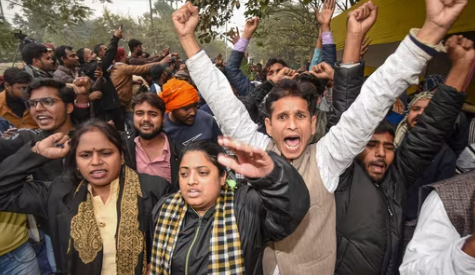Young and Hopeless: The Struggles of Aspirants (GS Paper 2, Governance)

Context:
- The disillusionment of youth due to recurring exam irregularities and a growing sense of hopelessness following the Bihar Public Service Commission (BPSC) controversy.
Introduction
- The examination system in India, especially for civil services, has long been a critical path for aspiring youth, particularly in states like Bihar.
- However, recurring allegations of paper leaks, exam irregularities, and cheating scandals in 2024 have left many candidates disillusioned.
- The most recent controversy unfolded with the Bihar Public Service Commission (BPSC) preliminary examination, held on December 13, marking yet another chapter in the ongoing struggle faced by candidates hoping for a brighter future through public-sector jobs.
Bihar Public Service Commission (BPSC) Controversy
Incident:
- The BPSC’s preliminary examination held on December 13 was embroiled in allegations of question paper leaks.
- In one of the exam centres in Patna, an alleged leak disrupted the examination, raising questions about the integrity of the process.
- Shortly after, reports of similar irregularities from other centres flooded in, leading to widespread student protests and calls for accountability.
Response:
- In the wake of mounting protests, the BPSC decided, on December 19, to conduct a re-examination at just one of the affected centres.
- However, many students, political leaders, and educators felt that this decision was insufficient, arguing for a statewide re-examination.
- Politicians such as Prashant Kishor and Tejashwi Yadav from the RJD joined the students’ cause, pushing for greater transparency and fairness in the examination process.
Nationwide Exam Controversies in 2024
The BPSC incident is not an isolated one; it is part of a broader trend of examination irregularities across the country in 2024:
- NEET-UG: Allegations of misconduct and irregularities led to widespread protests by students.
- NET and NEET-PG: The cancellations of exams fueled further unrest.
- State Government Recruitments: Other states like UP, Rajasthan, Maharashtra, and Tamil Nadu also reported issues with recruitment exams.
In response, the Central Government introduced the Public Examinations (Prevention of Unfair Means) Act (2024) to enforce stricter measures against exam malpractices and ensure fair conduct.
Implications of Exam Failures
Impact on Marginalized Aspirants:
- For many young aspirants from marginalized castes and classes, competitive exams represent the only viable avenue for social mobility and economic improvement.
- Government jobs offer empowerment opportunities amidst the vast socio-economic disparities in the country.
- However, recurring irregularities in the examination process undermine the faith of these candidates in the system.
Economic Realities:
- The economic challenges faced by aspirants are immense. From 2014 to 2022, only 0.33% of applicants successfully secured government jobs, underlining the fierce competition and low success rate.
- With limited job creation in the private sector, the reliance on public-sector exams for job security continues to grow.
Emotional and Financial Toll:
- Aspirants often endure significant emotional and financial hardships, including long-distance travel in overcrowded trains and buses, all in pursuit of a job that represents security and a chance to overcome economic hardships.
- Exam irregularities and cancellations only add to the burden, increasing their sense of hopelessness and disillusionment with the system.
Way Forward: Recommendations
Strengthening Exam Systems:
-
- It is crucial to implement stricter monitoring mechanisms during examinations to prevent malpractices such as paper leaks and cheating.
- Transparency in handling and distributing question papers must be enhanced, and technology can be leveraged to ensure accountability.
Empowering Aspirants:
-
- Financial and logistical support should be extended to marginalized aspirants to ease the burden of exam preparation and travel costs.
- Establishing effective grievance redressal mechanisms will help address complaints and ensure justice for students affected by irregularities.
Political Commitment:
-
- Political parties must recognize the importance of exam reforms and make them a priority in their electoral agendas.
- A coordinated approach involving the government, educational institutions, and civil society is necessary to address systemic issues that continue to plague the examination system.
Conclusion
- The plight of the youth, particularly in Bihar and other states, cannot be ignored.
- As India aspires to become a developed nation by 2047, it must ensure that its youth are given a fair chance at success, particularly through its examination system.
- Addressing the systemic issues plaguing exams will be essential for ensuring equitable opportunities for all aspirants, particularly those from disadvantaged backgrounds.
- The voices of the students and youth must be heard and acted upon to secure a brighter and more hopeful future for the nation’s young generation.


